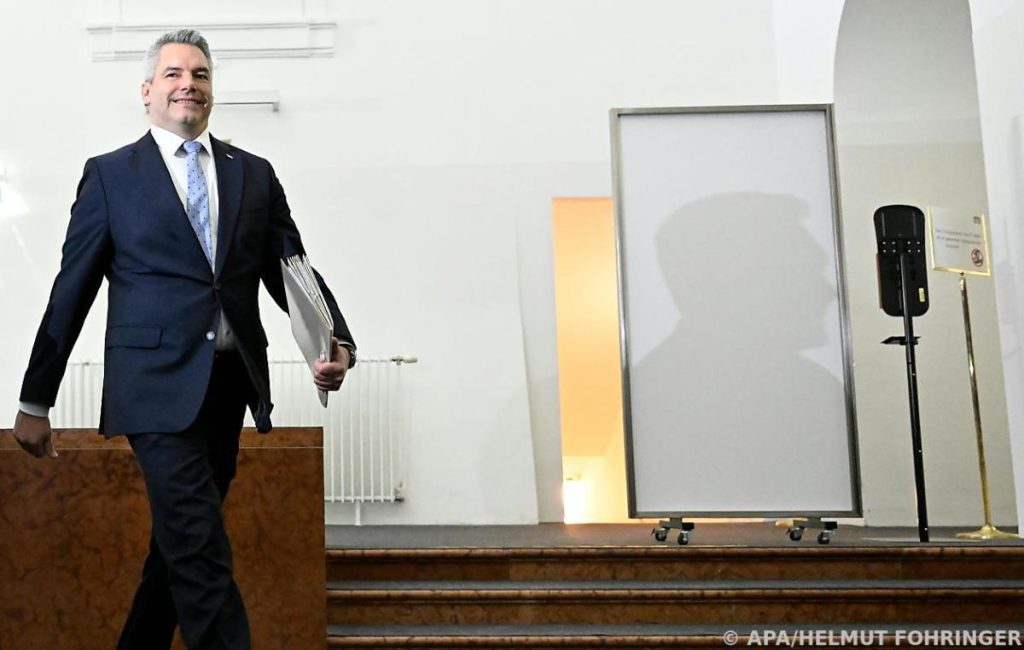As the ÖVP leaked to selected tabloid media on Tuesday, Chancellor Karl Nehammer wants to present a “five-point plan” on asylum and migration at the EU summit in Brussels. However, the Five Points plan is no more than five relatively vague demands on the EU.
Item 1: Police and Fences
The EU Commission must therefore “pay for police operations abroad that work to combat illegal immigration”, support countries at external borders with “border protection” and provide financial resources for infrastructure projects such as building fencing on the border between Bulgaria and Turkey.
For migration researcher Judith Kollenberger (WU Vienna), the question arises of what the EU border protection agency Frontex is and what role it should play when member states send individual police officers to other countries. Austrian police officers are already active in Hungary. According to the Ministry of the Interior, especially “in remote areas”. Kollenberger sees open legal questions: What are officials allowed to do at work and are they complicit in illegal repatriations?
According to Kohlenberger, building fences is not sustainable anyway – the EU’s external borders cannot be completely covered. The fences only alter escape routes, making them more dangerous and making refugees more dependent on people smugglers.
Point 2: rejection
According to the ÖVP, the EU Commission must draw up a ‘refusal directive’. What exactly is meant by that, the ÖVP remains guilty. What is certain is that the rule of non-refoulement, enshrined in the Geneva Refugee Convention, among other things, prohibits the return of people to countries where they would be threatened with torture or other serious human rights violations. According to Kohlenberger, an asylum procedure is needed to determine this.
Point 3: Asylum procedures in third countries
The ÖVP wants the asylum procedure to be carried out in “safe third countries”. What it should be is not explained. Great Britain and Denmark are named as role models. For example, Great Britain would like to ship refugees to Rwanda and complete their asylum procedures there. The European Court of Human Rights stopped the first flight.
There are other problems for Kohlenberger: First you have to find and pay for countries that want it. In addition, one has become dependent on countries with “often questionable human rights status” – similar to the EU’s deal with Turkey.
Clause 4: Revocation of Offender Protection Status
The ÖVP wants the EU to easily “abolish” the protection status of criminals. Criminal law and asylum law are essentially separate. But in the case of an offense with a sentence of more than three years, this is already possible. The crimes for which the ÖVP wishes to withdraw asylum are not made clear.
Even if asylum is denied after a crime has been committed, the question remains whether one can be deported at all: do countries of origin accept people, and would this prohibition against refoulement not be violated (see point 2)? This is often followed by the so-called Duldung – these are people who reside in Austria, but usually do not have a work permit.
Clause 5: Express asylum procedures at the external borders of the European Union
This point also in migration packageand others from the European Union Commission, which have been available for two years now. Kollenberger notes that “quickly” should refer to both positive and negative outcomes. “Quick action tends to have negative results.” The question is also what happens to people during the procedure, whether they are detained or allowed to move around in the EU.
Essentially, the migration researcher sees the ÖVP as a “wishlist from the center to the EU”. The ÖVP “wants to show a solid edge” and, above all, “send a domestic political signal”. As for Austria itself, the issue of refugee accommodation “has not yet been fully clarified”, and the intention is to “distract attention” from it.

“Food practitioner. Bacon guru. Infuriatingly humble zombie enthusiast. Total student.”







More Stories
Low temperatures – Krems area: Frost causes damage
Why is Austria now spending billions on missile defense?
For fruit growers, the waiting and trembling continues